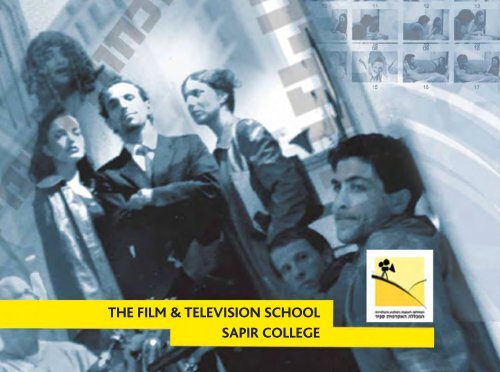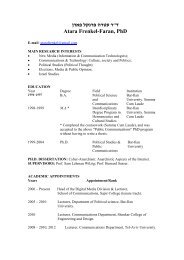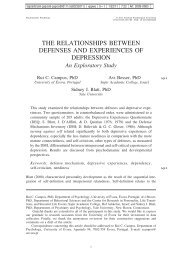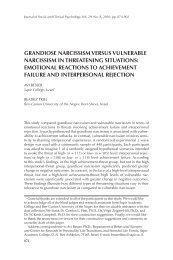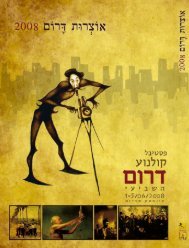THE FILM & TELEVISION SCHOOL SAPIR COLLEGE
THE FILM & TELEVISION SCHOOL SAPIR COLLEGE
THE FILM & TELEVISION SCHOOL SAPIR COLLEGE
Create successful ePaper yourself
Turn your PDF publications into a flip-book with our unique Google optimized e-Paper software.
Television specializationNew formatsB.f.A in Film, with concentration in television. Creative television: new programs and series, developing newformats and concepts.Exposure to advanced, revolutionary TV genres. Thinking and creating according to those trends.Creating TV dedicated to specific segments of the population and special groups of viewers.Creating high-quality public television (on the line of the UK’s Channel 4), as distinct from state television andcommercial TV that predominates in Israel.Developing unique programs for children and teenagers.Broadcasts from the studioThe Sony multi-camera TV studio features a control room and sound room. The studio is equipped withsophisticated test equipment and everything needed to produce professional television.A huge lighting warehouse.Acting classes in front of the camera.“Action” a news and culture program produced at the TV studio in collaboration with the Community CenterAssociations, is transmitted from the college via fiber optics to the Arutzei Zahav company which broadcastsit nationwide.Children’s TVStudents whose specialization in the television track is designated creation study the creating of televisioncontent aimed at children. The students learn at first-hand about what’s happening in the field today, andexamine alternative options to what is currently available. We aim to encourage new, original formats, includingdocumentaries created for children.“Ha’pitzuchiya” (The Convenience Store) – a new format documentaryRecent graduates of the school Yaniv Karsotzky and Morris Candiotti, wrote, directed and produced a documentaryseries now broadcast on Channel 8 via “Hot” cable TV. This is an totally original format documentary series thatshatters and subverts the consensus in documentary TV, stimulates thought about the genre’s boundaries, theparticipants’ role in the series, and the sort of truth generated by documentary creations.µ ∂
Animation specializationAnimation in the cinematic tradition.BFA in Film with a concentration in animation.An open studio that enables total self-expression by the animator and full control of the production stages,while working closely with teachers and leading animators who are hosted by Sapir.The program focuses on animation rooted in film language, as distinct from studying animation originating inthe plastic arts and design professions.Classic and historical foundations, with a strong emphasis on experimental, innovative animation.Sophisticated animation studiosAt the disposal of students in the animation track are two animation studios, fully equipped with the bestanimation equipment - Canon animation cameras, sand-tables for designing models, light tables, cutting-edgeanimation computers, computerized animation software, Maya 3D Max, and so on.∑
Sound Design specializationA new genre in music for cinema.New! Israel’s only academic program that awards a BFA in cinema, with a concentration inmusic product and sound design.A completely new genre in the field of music for film, allowing people with a generalbackground in music to design sound for television and filmRange of professions:Music editing, lyrics, orchestration, editing, instrumental playing and production.Broadening musical education and theoretical background.A particular emphasis on ethnic music and electronic music.The most professional tool-boxMeetings with leading creators in the field; editing with the latest systems – Cubase SX,Pro-Tools MIX PLUS, ProTools M-Box.High-speed connection to the film school’s computer network.Hundreds of music and effect CDs.∏
Sensitive, involved cinemaAt Sapir, there’s a special emphasis on social andpolitical sensitivity, and involvement in the widercommunity. Our courses are aimed at helping todeepen the participants’ societal and class-basedawareness; among those courses are - Cinema of theNear East, Women’s Narratives in Third World Cinema,The Fantastic and Subversive in Third World Cinema,Gender and Sexuality, Documentary Cinema from anAnthropological Perspective, Iranian Cinema, PopularIndian Cinema, Bollywood on Hollywood, Mizrahisand Mizrahiness, The Image of Minorities in IsraeliTelevision, and Classical Mizrahi Music Theory.Broadening education and honing awareness leads tothe search for alternative options, encountering newconcepts and fostering greater openness towardmulticultural cinema, and influencing fields of powerthereby. Students at Sapir are well-versed in the currentcinematic-theoretical and professional discourse invarious sites around the world. They engage withquestions that concern the most important creators,and are aware of highly daring approaches incontemporary cinema. As a result of their exposureto Third and Fourth World film and intensive debateson social and political injustice and bias, themes thatresonate powerfully in films created at Sapir - filmsthat are carving out their place in the vanguard ofsensitive, committed works.±∞
LATEST ACHIEVEMENTSThough the school is still young, its excellence and achievements are widely acknowledged in extensive circles,in Israel and elsewhere. Students’ films have been screened by major broadcasting channels, won prizes atfestivals across the world, have received support from top-flight foundations, and are the focus of great interestby the media. And most importantly – they are bringing alternative messages and content to the heart of thepublic agenda.“Family Pizza” – by Ronen AmarTook first place in the DocAviv festival 2003 and firstprize at the Southern Film Festival, bringing the filmnational and international exposure. It was sold tooverseas channels, was awarded a prize for the bestdocumentary film and a prize for editing at the ShortCinema festival.“Sapir film school is the best place to learn cinema inIsrael”, Omer maintains, “There’s freedom to createhere, and everyone brings his own truth to the screen.I just hope that this trend remains unchanged, andthat it won’t become like the other schools – that areonly interested in a production-line, not quality.”from “Family Pizza”±±
“Mirrors” – by Orly MalesaWinner of the Wolgin award at the 2004Jerusalem Festival.Stating their grounds for awarding first prize to“Mirrors,” the international panel of judges at the AnatFarhi Drama Festival, noted:“…with sparkling sophistication, the director mixes anaïve fairytale together with clear statements onintercultural conflicts, and the differences and balanceof power between the sexes and generations in twodifferent cultures. A special aesthetic and self-ironymake the story credible, liberating it from oversimplicityand casting conclusive guilt. Instead, we seethe complexity and loss resulting from a transitionfrom one homeland to another.”“Mirrors,” shot in 16 mm. in Israel and Ethiopia, receivedfinancial support from the Gesher Foundation forMulticultural Cinema, and the Yehoshua RabinowitzArts Foundation.It is the first Israeli-made film that deals with theEthiopian community from the perspective of a youngdirector who grew up within that community.“I feel that Sapir is my home” says Orly Malsa, “it’sthe place that shaped me and introduced me to film,which was a very important encounter, because todayI can’t imagine my life without cinema. And whereverlife takes me, something of Sapir will always stay withme.”From ‘Mirrors”±≤
Recent achievements“Sisai” – by David GavroA documentary film shot in Ethiopia and Israel.The film was granted NIS 180,000 by the SharonAmrani Multicultural Foundation. It was accepted atthe Co-production Forum and the DocAviv festival.“The teachers at Sapir are very experienced,” commentsDavid Gavro, “and the personal world of each andevery student is really important for them. I came toSapir from Netivot, and met people of all types fromall over Israel, and got to know some fascinatingpersonal worlds. At Sapir, I felt completely at home,and was given all the encouragement I needed tomake my first film.”SSSR Kids – by Felix GerchikovThe YES satellite broadcasting company has grantedfunding of 600,000 dollars to this film, and theYehoshua Rabinowitz Foundation is also providingfunding.Felix Gerchikov, a Sapir graduate and director of thefilm “Jaya” (a co-production with Oded Tzur) took firstplace in the Israeli Greenlight contest held by YES andthe JCS production company for full-length dramaticfilms. “SSSR Kids” addresses the absorption problemsof immigrants from the FSU who live alongside veteranIsraelis in the town of Netivot, as well as the ethnicbasedtensions within the Russian community itself– between Caucasians, Russians, Ukrainians… It willbe screened in Israeli cinemas and on the YES satellitechannels.“While I was at Sapir, I was given all the practical andtheoretical tools I needed,” Gerchikov says, “and I’vecome so far thanks to the aspirations and will-powerthey poured into me at the school, over the years.”from JayaJaya – Oded Tzur and Felix GerchikovFunded by the Aliza Shagrir Foundation.“I graduated from the practical engineers track atSapir, and I’m now completing my undergraduatestudies at the college,” explains Oded Tzur, “Thepractical engineering studies trained me in every aspectof film and TV work, while in the academic track I’mboosting my theoretical know-how.“I believe that combining these two tracks is ideal.Currently I’m doing investigative work for adocumentary film on the special love between mygrandmother and grandfather, who’ve been marriedfor over 50 years”From “Sisai”±≥
Remote Control Kids– Nahum LandauSecond place in the 2004 DocAviv festival, and fundedby the Yehoshua Rabinowitz Arts Foundation.After winning, the film was requested by the IDFAfilm festival in the Netherlands.“At Sapir, I found everyone to be tremendously opento the world the students bring with them,” recallsNahum Landau. “The teaching faculty are highlyprofessional and accessible, the equipment is thelatest, and there’s a really great atmosphere amongthe students. Thanks to the school, I’m continuing towork in the field, producing and directingdocumentaries and image films.”From “Remote Control Kids”±¥
Recent achievementsLiba Bai – Naama ShemeshIn 2003, the film took part in the ninth Students Filmfestival in Tel-Aviv.Na’ama Shemesh comments - “My final project filmwas about a young religious woman who disguisesherself as a yeshiva student, so she can form an opinionon the male experience of religion,” and adds that,“For me, Sapir means freedom, independence, creating,and people you don't meet anywhere else.”For the Sake of ImperfectCinemaErez Perry and Oren SenantWon the Outstanding Film award at the SouthernFilm Festival – which was the impetus for thisunorthodox film to be widely screened throughoutIsrael – at the Am Oved publishing house event in theJerusalem Cinematheque, and screening followed bydebates at the Hebrew University, Haifa University,and at Tel-Aviv University’s student film festival, amongothers.“Our film takes issue with the state institutions whichmanufacture knowledge and conserve an ideology ofinequality. Though we made the film in an alternativetrack,” Oren notes, “without any mentors, but evenso the college let us proceed – and this film wouldn’thave been allowed in any other Israeli film school.”From: For the Sake of Imperfect CinemaFrom “Liba Bai”±µ
Grandfather – Amram YaakobiWinner of the first Perlov AwardThe award given to Amram Yakovi is the first grantedby the foundation established in memory ofdocumentary director David Perlov. Following theaward, the film was screened by Keshet on Channel2 television“As I see it, it’s far more than a film. And I see it asa joint venture with my grandfather who is myspiritual mentor. I made the film for the generalaudience, which allowed me to share my heritagewith others. In this sense, “Grandfather” is not aregular documentary, but at Sapir I had the freedomto do what I wanted in a very unorthodox way,which allowed me to preserve my individuality.”From “Grandfather”From “Standing Tall”Where to – Hadar BashanWon the Southern Film Festival prize in 2003.The film was later shown at the DocAviv festival in2004, and at the tenth international students filmfestival. Dana Bashan admits: “I was quite differentfrom the other students, because as a mother of sevenchildren, living in the Nveh Dekalim settlement inGush Katif, there was a lot of disagreement with myworld at Sapir. And yet, I found a warm home therewith lots of really genuine willingness to give, acommon language and shared contents albeit wrappedin outward objections. My conclusion is that in a placewith people who love the thing itself, whatever theirage and political opinions – there’s an immenseamount of shared and mutual understanding. I missmy years at Sapir.”Room 19By Tom Gurfinkel; cinematographer –Lital ShaharFirst place in the Short Film Festival.Lital Shahar - “Sapir, to my mind, is a loving homethat succeeds in extracting what everyonehas inside them.”Tom Gurfinkel says “The best decision I ever madewas to enroll at Sapir. On my first day, I had no ideahow to hold a stills camera in my hand - and nowI’m making films.”Standing Tall – by Mili InbariBest Documentary award at the 2004 SouthernFilm festival.“Studying at Sapir is quite an experience,” recalls MiliInbari, “and in particular, I think, because at Sapirthey’re still seeking the right road. And evolving qualityalso lets everyone seek their own individual road”.From: Where to?±∂
HANDS-ON WORKIN INDUSTRYStudents get to grips with thefilm and television industryThe school meticulously screens applications fromorganizations in the cinema and film industry lookingfor students from Sapir who will take part inproductions and joint ventures.Groups of final-year students spend a period of timeworking on chosen productions, acquiring professionaland personal experience in the “real world” laterprocessing what they have learned with the teachingfaculty.From the film “Yossi and Jagger”±∑
Hundreds of the school’s graduate now hold keypositions in the film and TV industry, in Israel andelsewhere – as television directors, film directors,producers, investigative researchers and screenwriters,television and film camera crews, editors, sound people,artistic directors, and lighting specialists.From the series: “The Truck”±∏
SOUTH<strong>FILM</strong> FESTIVALA hot, young cinematic event. It began with a modest screening of our graduates films at the Tel-AvivCinematheque, moved three years ago to the Sderot Cinemathèque where it has flourished and become abubbling, highly visible cinematic event.The enthusiasm stirred up by the festival has been converted into additional resources which have made it aninternational event, presenting our graduates’ films alongside a rich mixture of screenings and events.Turn left at the End of theWorldIn 2003, the Southern Film Festival opened with thescreening of the latest film by director Avi Nesher“Turn Left at the End of the World” and theannouncement that henceforward a new Israeli filmwould open each festival. During the festival, newfilms - local and international - were shown, with talksby cineastes from Turkey, Sri Lanka, Switzerland, andthe USA, among others.As well as the master-class given by actor RichardGere, workshops were held with several directors -Eitan Fuchs (Walking on Water), Gur Bentwich(Something Total), Eitan Green (Henry’s Dream) withthe producer Osnat Trabelsi (Arna’s Children) withdistributor Dvora Zimmerman among others.The festival was held in conjunction with the SderotCinematheque, the Forum of Documentary Creators,and the Mendel Institute for Leadership, and themeetings and workshops were open to the generalpublic. The festival, mostly produced by volunteers,invites students to an intensive experience in complexproduction techniques and deepens the ties betweenthem and local citizens, as well as the entire filmcommunity.The festival has several sponsors; this year, the mostnotable was Keshet - the franchisee of Channel Two,which took on itself the task of publicizing the festivalin television broadcasts, and also transmitted a morningtelevision program from the college.This year, the Southern Film Festival, which is opento everyone at no charge, won extensive exposure inthe media, including a special supplement in the TimeOut magazine.From “Turn Left at the End of the World”±π
“South” – “Migration”–“Daring”Every year, the festival focuses on a keynote issue.This year we chose the concept “daring” and exploredits significance in cinematic creation.The previous year, it dealt with the experience ofmigration, and brought together cinema creators whohad migrated to and from Israel.Our first festival highlighted the term “south” and itscinematic representations. The decision to highlighta different, relevant subject each year contributes tothe festival’s explorative nature and uniqueness.From the films screened at the graduates film contest.≤∞
A look into the future<strong>THE</strong> <strong>SCHOOL</strong> OF <strong>FILM</strong> & VISUAL ARTSRelying on the numerous achievements we haveaccumulated in a few short years, and in view of theconstantly growing demand, the school is now gearingfor an expansion and development move that willlead to the opening of Israel's first School of film &visual Arts. With close cooperation with the city ofSderot and other nearby localities, a program has beendrawn up to build a unique center where local andinternational cineastes and artists can visit and work.Among the ventures planned are studies toward amasters degree in film and television arts, masterclasses,festive screenings, exhibitions, academicconferences, and opening new specialization tracksfor undergraduate degrees.We strongly believe in the importance of the voicethat’s being fostered in the periphery. We are confidentboth in our ability to make that high quality, originaland unequivocal voice more widely known, and in ourpotential to change and influence. Time and again, wesee in the work we’ve done so far at Sapir day thepower of cinematic and television endeavors to createrapprochement between the different and the distant.For that nascent voice to strengthen and grow, wewill have to construct the buildings needed, expandthe technological infrastructure, and encourage researchand the dissemination of the results - here in Israeland around the world. In this way, we intend totransform the existing center into a “School of film& visual Arts” – a place that will produce original,interesting work that will be heard loud and clear inIsraeli culture.≤±
≤≤
The Film & Television SchoolSapir College, M.P. Hof Ashkelon 79165, IsraelPhone: 972-8-6802838 Fax: 972-8-6802834College website: www.sapir.ac.ilSouthern Film Festival website: www.sff.sapir.ac.ilInformation Center: phone 972-8-6802802 / info@sapir.ac.il


